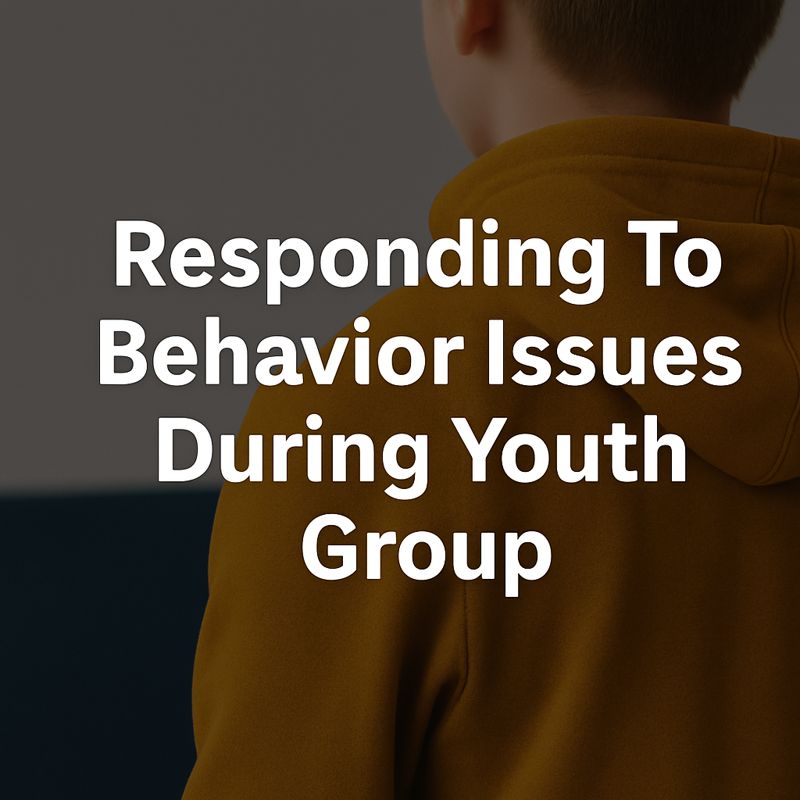
Responding To Behavior Issues During Youth Group
A tired, defeated youth pastor emailed me recently asking for advice about behavior issues during youth group. She had already

If you’ve been doing youth ministry for a while, you know that teenagers love big moments. They love camp worship that gives them chills. Teenagers love a sermon that hits home. They value mission trip moments that changes their whole outlook. Part of that is normal developmental stuff. Teenagers crave the thrill of big moments. But, of course, some of that isn’t just an adolescence thing. It’s a human thing. But real, lasting faith isn’t built on emotional highs alone. It’s shaped in the quiet, ordinary moments—the daily decisions no one sees. So let’s talk about how we can teach teenagers about the power of daily faithfulness in small ways.
Many teenagers believe faithfulness is about big, dramatic acts. They would never say some of these things out loud, but they’ll certainly think or believe the following statements:
“I’ll serve God when I’m older.”
“Maybe I’ll be faithful when I have more time.”
“I’ll start reading my Bible when I feel closer to God.”
And our job as youth pastors is to teach teenagers how powerful small, daily faithfulness can be in the here and now of their adolescence. A single prayer today builds the habit for tomorrow. One moment of obedience lays a foundation for trust. A small step of faith today shapes a lifelong walk with Jesus.
So if we want to teach this, we can approach it a few different ways. Challenge them to choose one small act of faith this week—just one. Use analogies they’ll get ( ie: athletes don’t become strong overnight, musicians don’t master an instrument in a week). Spiritual growth works the same way. Emphasize consistency over perfection. Small steps, repeated over time, make a big difference.
Teenagers are driven by how things feel. If it’s exciting, they’re all in. If it feels dry, they’re out. But the path of spiritual maturity doesn’t always feel exciting. Some days, prayer feels powerful. Other days, it’s just quiet. Some days, worship moves them. Other days, it feels routine. Some days, reading Scripture feels alive. Other days, not so much.
And that’s okay. Faith that lasts isn’t built on emotion. It’s built on choosing faithfulness even when it’s hard. And, as adults, we know that life is often hard. Good. But hard.
So if we want to teach this reality to teenagers, here are some tips. Be honest about your own spiritual life. Let them know that even pastors have dry seasons. Teach them to press through. Faithfulness looks like showing up, even when the feelings don’t follow. Help them look at the long-term. Small spiritual habits done consistently have deep, lasting impact.
Feelings change, but faithfulness can stay steady.
Students crave spiritual breakthroughs. But those don’t usually show up out of nowhere. We see examples of the power of small, daily faithfulness all throughout Scripture. David was faithful in the fields before he became king. Jesus spent decades in everyday faithfulness before His ministry began. The disciples followed Jesus daily before they changed the world.
Those “big” moments? They’re the fruit of quiet, consistent faithfulness.
So if we want to teach teenagers about the power of small, daily faithfulness, here are a few ways to frame it up. Encourage students to track their small spiritual habits—prayer, Scripture, community—and reflect on the changes over time. Celebrate consistency. Don’t just recognize the loudest or most emotional student. Celebrate the ones who show up every week. Give them accountability. Pair them with mentors or small groups to help them stay encouraged in the day-to-day.
Big transformation comes from small steps, repeated over time.
Students don’t need more spiritual highs. They need more spiritual consistency. They need a faith that’s built up into a solid home brick-by-brick. Small, daily faithfulness builds real change. When students begin to see faith through the lens of the gospel, they realize they’re not trying to earn anything. They’re simply learning to respond to God’s love in every part of life—big or small.
The power of daily faithfulness lies in its cumulative impact. Small acts of obedience form the character of Christ in us. Help your students see that the mundane matters. And if you need a curriculum that builds daily disciplines into your teaching, explore our Small G, Base G, and Top G plans.
Check out Redirect & Moments – Sermon series designed to help students recognize God in the small moments of life.

A tired, defeated youth pastor emailed me recently asking for advice about behavior issues during youth group. She had already

It’s a fact: we could not do youth ministry or have a thriving group without our volunteers. Volunteer leaders allow

If you’ve been in youth ministry longer than a few years, you’ve had a student bring up divorce at youth